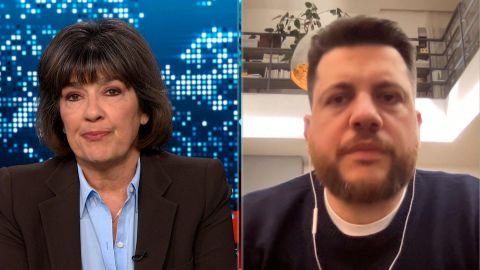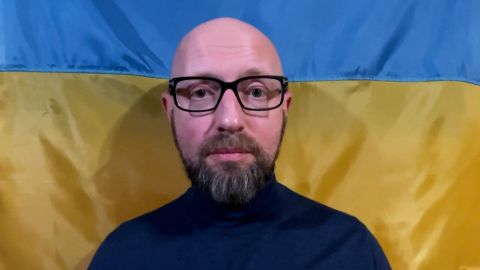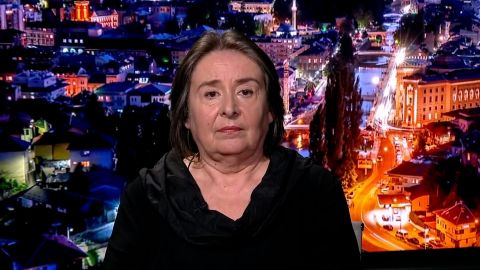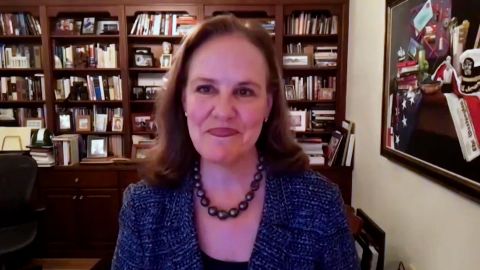Read Transcript EXPAND
CHRISTIANE AMANPOUR: Now, Vice President Kamala Harris is visiting Poland at a critical moment for Ukraine, Europe and the Biden administration. Our next guest is the former undersecretary of defense, Michele Flournoy, who’s close ties with the Clinton and Obama administration, as well as with Secretary of State Antony Blinken. And she joined Walter Isaacson to discussed the impact this crisis will have on America’s security interests, particularly when it comes to China.
(BEGIN VIDEO CLIP)
WALTER ISAACSON: Thank you, Christiane. And Michel Flournoy, welcome to the show.
MICHELE FLOURNOY, CO-FOUNDER AND MANAGING PARTNER, WESTEXEC ADVISORS: Good to be with you.
ISAACSON: President Biden just announced that we’re going to cut off Russian oil being brought into the United States. Can that be very effective if China continues to buy it, and China resists these ideas of pushing back on Russia?
FLOURNOY: Well, I think the president’s decision was the right one, but it is because we don’t rely very much on Russian oil in the United States, it is symbolic, but it also sets an example. And I think we’ve seen the Europeans follow with pledges to reduce their gas consumption by two-thirds this year. And so, I do think it’s important as a leadership move to sort of lead the international community in this direction given how important oil and gas imports are to the Russian economy and the Russian state budget.
ISAACSON: Yes. But China, China just doesn’t seem to be going along. Are these sanctions going to work if we can’t get China a little bit more on our side?
FLOURNOY: I do think the collective sanctions from the entire Transatlantic community and other countries in Asia will have a devastating impact on the Russian economy. China has doubled down, which is sort of mysterious to me. I would think that given the failures that Putin is experiencing in Ukraine, and what it’s going to do to him, make him a pariah, I would think that President Xi would be thinking about distancing himself from Putin. But for the moment, they’re doubling down. They will cushion some of the blow with buying wheat, buying oil and gas and so forth, but they’re not going to be able to do that at the scale that would really reduce the overall impact of the sanctions.
ISAACSON: President Biden sent you and Admiral Mike Mullen on a trip to Taiwan very recently to talk to the leaders of Taiwan. First of all, what did you say to the leaders of Taiwan?
FLOURNOY: Well, our trip was designed to reassure the Taiwanese people and the Taiwanese authorities that, you know, the United States values them as a democracy in the region, that they are valued as a very critical economic and technological partner and that, you know, they have a lot of support in the international community. Part of what this was in response to is we see China amplifying messages in Taiwanese social media that’s basically trying to say, you know, today Ukraine, tomorrow Taiwan. Resistance is futile, you might as well give up on your democracy now because it’s not going to last. And I think it was very important for the United States to communicate both to Taiwan and to China that even though we’re engaged in this crisis in Europe, we have not taken our eye off the ball in the important situation in the Indo-Pacific.
ISAACSON: So, you see evidence that China might be using the Ukraine situation as a way to say, all right, now, we’re going to put more pressure on Taiwan. Perhaps even try to take over the governance of Taiwan. Is that right?
FLOURNOY: I certainly see them doing that in the information space, and they continue to violate, you know, Taiwan’s air defense zone, and so forth. I don’t think we are seeing an imminent military move. President Xi has the 20th Party Congress coming up at the end of this year, he wants to be made leader for life. He wants stability and calm this year, leading into that key political moment for him. I worry more about after that. Once he turns to the question of his legacy. And I — and he said very clearly, he wants to be the leader who reunites China. I worried more about the mid to long-term future with regard to Taiwan.
ISAACSON: China expected that the Biden administration would reset a bit to use a phrase policy towards China after the very strong anti-China message of the Trump administration, and yet that hasn’t happened. The Biden administration sent more deployments, military deployments to the South China Sea. What’s the rationale of continuing this fight against China?
FLOURNOY: The rationale is the change in Chinese behavior. When we saw Xi come into power, they really dropped their prior stance of which many analysts called hide and bide. You know, sort of hide your true intentions and ambitions and bide your time. When Xi came in, China began to really flex its muscle as a rising power. It began to take much more coercive actions in the East China Sea, vis-a- vis Japan and disputed islands there, in the South China Sea via a number of countries. And also, just more aggressive actions with regard to the United States as well. So, you know, I think the administration has responded to their actions and they’re somewhat limited by the degree to which China is willing to back off some of those aggressive actions. I think there’s also a very strong bipartisan consensus about the threat that China poses to us economically, technologically, militarily, even ideologically, in terms of the contest between authoritarian and democratic systems, and that is both great support for the administration when it wants to take moves but also a certain degree of constraint in terms of how far they can move outside that consensus when engaging China. So, I think if we want to see a change in U.S. policy, we need to see a change in China’s behavior. That’s the bottom line. What do you need to see?
FLOURNOY: I think you need to see, you know, China come to the table on trade in a much more productive way, willing to sort of address some of their practices that distort — you know, that deny others, including the United States a level —
ISAACSON: Well, wait. Let me push back on that. We’re facing an existential threat with Russia invading a country in Europe and we have trade disputes with China? It seems this is a misbalance of calculation.
FLOURNOY: Well, the source of our economic power is our economy and our economic foundation. And when we’re trying to — we have a deep economic relationship with, you know, the largest — the second largest economy in the world, we have to have some rules that govern that. We have to have China abiding by the rules it signed up to for the World Trade Organization. So, yes, I understand, you know, there’s — it’s a totally different situation from the crisis in Ukraine. But the U.S. has to be able to deal with the Russia crisis and also protect its interests in, you know, the region of the world that is going to affect our security and our prosperity more than any other in the next half century.
ISAACSON: I was just in Houston for the Sarah Energy Conference, and they were saying — we’re talking about two or three years of this war. Do you agree that that’s a possibility?
FLOURNOY: I think it’s many months, possibly years. I think a lot will depend on what happens in the next several weeks. You’ve seen this tank column that was supposed to encircle Kyiv very quickly depose the government, put a friendly government in and depart. Well, that plan A didn’t work so well for Putin. You now have another column coming in to back them up. But there’s a debate in the analyst community about whether the Russians can even pull that off. If they do pull it off, it’s going to be a longer war. If they can’t pull it off, this may, you know, culminate in months rather than years. So, we will have to see and pray on behalf of the Ukrainian people that it ends sooner rather than later.
ISAACSON: Well, you seem to be saying we should do more than pray, we should be helping our NATO allies send in, what, stinger missiles, send in planes and to what extent do we send those in?
FLOURNOY: Well, I think we should be sending in everything the Ukrainians need particularly antitank weapons like the javelins as well as stingers. They have requested MiG-29s, which some of our former Soviet bloc states who are now part of NATO have. The challenge there is, you know, where would you operate them, how would you support them and make them operational, but I think we should try to help them solve that problem because, you know, those aircraft can be very effective in defending the skies when you do have a humanitarian corridor trying to evacuate civilians. If armed correctly, they can also be very effective against massed tank columns, like the one outside Kyiv. So, I think we need to bend over backwards to help the Ukrainians as much as possible, and on a sustained basis because, again, this is not going to be over anytime soon.
ISAACSON: We need to help them solve that problem, you just said, the problem of not being able to use MiG fighters without support from the West, and how to do it. What do you mean we have to help them? Does that mean sending in U.S. military advisers?
FLOURNOY: No, I don’t think we should actually cross the line in send in U.S. troops or NATO troops, because I do — Putin has been very clear, he would see that as NATO becoming a combatant in the conflict, and then we risk a much wider, more catastrophic war in Europe and the risk of nuclear escalation, which Putin has already put on the table. So, no. But, you know, I do think there are plenty of opportunities. You know, we have trained with the Ukrainians a lot since 2014. They are a very different force than they were before the Putin seizure of Crimea. So, I think there’s, you know, supplying them with weapons and maybe some planning, and as much intelligence, as much real-time intelligence on what — where the Russian forces are, where — what they’re doing, that’s the best way we can help them right now.
ISAACSON: You’ve been a longtime friend and partner of the now secretary of state, Antony Blinken. He said he went to Europe — NATO allies in the past few days and said, not one inch of NATO. Not one inch will we allow the Russians to take. Do you think it’s now conceivable that Putin would try to move further than Ukraine and go into Poland or a NATO country?
FLOURNOY: I don’t think Putin would be wise to do that. I think he’s having trouble consolidating his — you know, even executing his campaign in Ukraine. I think it would be a real stretch for him to come into NATO territory. But I do think there are a couple of risks that I’m guessing the secretary was referring to. One is you now have NATO aircraft patrolling the skies over the border. You have Russian aircraft operating in close proximity. Whenever you have opposing military forces up against each other, there’s risk of some kind of accident, unintended, you know, transgression. And that can escalate into something, especially if lives are lost. It’s one of the reasons why the administration reached out to Moscow and established this line of communication to try to manage a situation like that should it occur. The other risk is that if we do continue to supply the Ukrainians from NATO territory, at some point, Putin may decide, you know, I’m going to stop that, and he may go after a convoy or what have you, and make the mistake of hitting the convoy in NATO territory, rather than Ukrainian territory. And that could, again, set off a discussion within NATO about whether, you know, this constitutes, you know, merits a strong response or what kind of strong response it merits.
ISAACSON: Ukrainian president, Zelenskyy, has called for a no-fly zone, which, unfortunately, is a bit of a sanitized phrase, meaning send in in your aircraft to shoot down Russian aircraft. The president said, no way we’re going to do that. Is there any wiggle room in that argument about whether or not we should engage in making the skies over Ukraine safe from Russian forces?
FLOURNOY: Well, I do think the alternative is supplying the aircraft to the Ukrainian pilots who know how to fly them. The problem with the no-fly zone, first of all, it’s limited in its coverage. It’s really an air-to-air measure unless you authorize the aircraft to hit targets on the ground, which of course in this case would be entering into a direct conflict with Russia. But the mortars, artillery shells, rockets, longer range missiles that Russia is using to pulverize Ukrainian cities would not be stopped by a no- fly zone. But I think — but what the president is saying is, you know, if you have NATO aircraft engaging Russian air craft, NATO has entered the war. That is combat. That is entering the war, and that is the line he’s trying not to cross to keep this from escalating and widening across Europe.
ISAACSON: In order to replace the Russian oil, I mean, we’re hitting $4 a gallon, even in Louisiana, down here. And I know up where you are, it’s $5 and sometimes $6 a gallon. We have turn to Venezuela and tried to restore somewhat a very bad relationship with Venezuela. Biden’s administration has tried hard to make better contacts with the Saudis who we have not had good relationships with under the Biden administration. Do you think we now have to real quickly figure out ways to deal more closely with the Saudis and maybe Venezuela?
FLOURNOY: You know, I think the administration is pulling out all the stops to try to replace the Russian oil that will be taken off the market to try to, you know, stabilize prices. Another example of this is, you know, I don’t think this is going to be the reason we get an Iran deal, but I think we are very close in the negotiations to getting constraints reimposed on Iran’s nuclear weapons program. And —
ISAACSON: Would that open up oil from Iran?
FLOURNOY: And if that did, that would open up their ability to export at least some of their oil. And that —
ISAACSON: Are you worried that if we do that people will say, we made a bad Iran deal in order to get oil?
FLOURNOY: Yes. I mean, there’s — I’m sure that there are folks who will be critical of the administration and make that argument. The truth is the deal was coming to fruition before this crisis happened. But the secondary implication is that there may be some additional oil on the market. So, you know, I think the administration is in the process of exploring all of the options, nothing’s been decided with Venezuela. Nothing has been finalized with regard to Iran. So, we’ll have to see. I do think the best approach is to go to our partners in the Gulf, OPEC, and say, you know, can you increase production to make up for this, to stabilize the price of oil globally?
ISAACSON: This is war, if it goes on for a year or two years, will be a total disaster. So, there needs to be some off ramp. There needs to be a way to say, all right, let’s all come to some conclusion. Do you see any possible solution or off ramp that the Russians could possibly accept and that we and the Ukrainians could accept?
FLOURNOY: You know, I think that remains to be seen. I don’t want to rule it out. I think much of it depends on what the Ukrainian people decide that they can live with. Can they live with saying, OK, we’re, you know, Crimea is yours or can they live with saying, you know, we’re going to be a neutral country, like Finland or Switzerland, can they live with some kind of different status for the eastern most provinces. But I think it’s — you know, if we really want to support democracy and Ukraine’s sovereignty, we have to start with what are the Ukrainians willing to accept here. They’re the victims in this conflict, and they’re the ones we’re trying to support. I think a lot of it will depend on whether Putin comes to the realization that his maximalist games — his maximalist objectives are completely unrealistic, and he has to pull back in terms of his goals.
ISAACSON: Do you think that’s possible? Do you think he’s rational enough to do that?
FLOURNOY: I think he — I don’t know, but I think that at some point he will risk creating enough internal discontent both at the sort of grass roots level. We’re remarkably seeing protests about this war already in Russia, and among his elite, the oligarchs who support him. That is a very dangerous combination for any authoritarian leader. You know, you’re the historian. In history, that combination is when dictators tend to lose their jobs if not their lives. So, I think if that really ramps up because of the sanctions, and because Russia is not succeeding on the ground in Ukraine, you know, you could have Putin change his calculus to try to save himself, but we are a very long way from that point, and that is pure speculation on my part. I don’t think it’s the likely scenario at this point but it’s not impossible as this drags on.
ISAACSON: Michele Flournoy, thank you so much for joining us.
FLOURNOY: Thank you, Walter. Good to speak with you.
About This Episode EXPAND
Ukraine’s former prime minister gives an update on the war. Leonid Volkov discusses Russian attitudes toward Putin. Journalist Aida Cerkez reflects on the parallels between the Bosnian War and the war in Ukraine. Former top defense official Michèle Flournoy explains the impact the crisis will have on America’s security interests, particularly when it comes to China.
LEARN MORE



